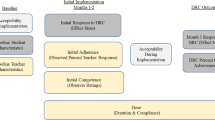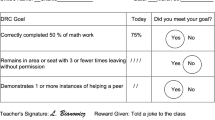Abstract
Noncontingent reinforcement (NCR) is an effective behavioral intervention when implemented consistently. NCR may be particularly well-suited for use in schools because of its perceived ease of use. However, previous laboratory research suggests that NCR may not maintain therapeutic effects if implemented inconsistently. Inconsistent implementation (i.e., implementation with integrity errors) is likely when teachers are expected to implement NCR alongside many other responsibilities. The purpose of this experiment was to assess the efficacy of NCR with integrity errors for students with disruptive behavior in a school setting. We evaluated NCR with errors of commission (reinforcers contingent on challenging behavior) and errors of omission (omitted response-independent reinforcers). At least one error type was detrimental for each participant. These results, in conjunction with previous findings, suggest that NCR should be implemented with high integrity to remain consistently effective. Suggestions for the use of NCR in schools are provided.



Similar content being viewed by others
Notes
IOA scores below 70% in any single session occurred for Herbert (both evaluations) and Jack (omission evaluation). There were six sessions in which IOA scores for challenging behavior dropped below 70%; these tended to be sessions with high or variable responses rates (e.g., baseline). There were two sessions during which IOA on reinforcer delivery decreased below 70%, but without a clear predictor (one baseline and one NCR 100% session).
The experimenter provided conversational attention independently of participant responding to reduce potential false positives in the tangible condition due to attention being withheld (thus evoking attention-maintained behavior) or the provision of attention only contiguous with the delivery of a tangible item (thus making attention-maintained behavior appear tangibly maintained).
References
Arkoosh, M. K., Derby, K. M., Wacker, D. P., Berg, W., McLaughlin, T. F., & Barretto, A. A. (2007). Descriptive evaluation of long-term treatment integrity. Behavior Modification, 31(6), 880–895. https://doi.org/10.1177/0145445507302254
Berdeaux, K. L., Lerman, D. C., & Williams, S. D. (2022). Effects of environmental distractions on teachers’ procedural integrity with three function-based treatments. Journal of Applied Behavior Analysis, 55(3), 832–850. https://doi.org/10.1002/jaba.918
Brand, D., Henley, A. J., DiGennaro Reed, F. D., Gray, E., & Crabbs, B. (2019). A review of published studies involving parametric manipulations of treatment integrity. Journal of Behavioral Education, 28(1), 1–26. https://doi.org/10.1007/s10864-018-09311-8
Carr, J. E., Coriaty, S., Wilder, D. A., Gaunt, B. T., Dozier, C. L., Britton, L. N., Avina, C., & Reed, C. L. (2000a). A review of “noncontingent” reinforcement as treatment for the aberrant behavior of individuals with developmental disabilities. Research in Developmental Disabilities, 21(5), 377–391. https://doi.org/10.1016/s0891-4222(00)00050-0
Carr, J. E., Nicolson, A. C., & Higbee, T. S. (2000b). Evaluation of a brief multiple-stimulus preference assessment in a naturalistic context. Journal of Applied Behavior Analysis, 33(3), 353–357. https://doi.org/10.1901/jaba.2000.33-353
Carr, J. E., Severtson, J. M., & Lepper, T. L. (2009). Noncontingent reinforcement is an empirically supported treatment for challenging behavior exhibited by individuals with developmental disabilities. Research in Developmental Disabilities, 30(1), 44–57. https://doi.org/10.1016/j.ridd.2008.03.002
Codding, R. S., Feinberg, A. B., Dunn, E. K., & Pace, G. M. (2005). Effects of immediate performance feedback on implementation of behavior support plans. Journal of Applied Behavior Analysis, 38(2), 205–219. https://doi.org/10.1901/jaba.2005.98-04
DiGennaro Reed, F. D., Reed, D. D., Baez, C. N., & Maguire, H. (2011). A parametric analysis of errors of commission during discrete-trial training. Journal of Applied Behavior Analysis, 44(3), 611–615. https://doi.org/10.1901/jaba.2011.44-611
Foreman, A. P., St. Peter, C. C., Mesches, G. A., Robinson, N., & Romano, L. M. (2021). Treatment integrity failures during timeout from play. Behavior Modification, 45(6), 988–1010. https://doi.org/10.1177/0145445520935392
Fryling, M. J., Wallace, M. D., & Yassine, J. N. (2012). Impact of treatment integrity on intervention effectiveness. Journal of Applied Behavior Analysis, 45(2), 449–453. https://doi.org/10.1901/jaba.2012.45-449
Gouboth, D., Wilder, D. A., & Booher, J. (2007). The effects of signaling stimulus presentation during noncontingent reinforcement. Journal of Applied Behavior Analysis, 40(4), 725–730. https://doi.org/10.1901/jaba.2007.725-730
Hagopian, L. P., Fisher, W. W., & Legacy, S. M. (1994). Schedule effects of noncontingent reinforcement on attention-maintained destructive behavior in identical quadruplets. Journal of Applied Behavior Analysis, 27(2), 317–325. https://doi.org/10.1901/jaba.1994.27-317
Individuals with Disabilities Education Improvement Act, 20 U.S.C. § 1400 (2004).
Iwata, B. A., Dorsey, M. F., Slifer, K. J., Bauman, K. E., & Richman, G. S. (1994). Toward a functional analysis of self-injury. Journal of Applied Behavior Analysis, 27(2), 197–209. https://doi.org/10.1901/jaba.1994.27-197 (Original work published 1982)
Jones, S. H., & St. Peter, C. C. (2022). Nominally acceptable integrity failures negatively affect interventions involving intermittent reinforcement. Journal of Applied Behavior Analysis, 55(4), 1109–1123. https://doi.org/10.1002/jaba.944
Luczynski, K. C., & Hanley, G. P. (2009). Do children prefer contingencies? An evaluation of the efficacy of and preference for contingent versus noncontingent social reinforcement during play. Journal of Applied Behavior Analysis, 42(3), 511–525. https://doi.org/10.1901/jaba.2009.42-511
Meindl, J. N., Ivy, J. W., Glodowski, K. R., & Noordin, K. (2021). Applying standards of effectiveness to noncontingent reinforcement: A systematic literature review. Behavior Modification, 45(4), 619–640. https://doi.org/10.1177/0145445519865073
National Autism Council. (2015). Findings and conclusions: National standards project, phase 2.
Phillips, C. L., Iannaccone, J. A., Rooker, G. W., & Hagopian, L. P. (2017). Noncontingent reinforcement for the treatment of severe challenging behavior: An analysis of 27 consecutive applications. Journal of Applied Behavior Analysis, 50(2), 357–376. https://doi.org/10.1002/jaba.376
Ringdahl, J. E., Vollmer, T. R., Borrero, J. C., & Connell, J. E. (2001). Fixed-time schedule effects as a function of baseline reinforcement rate. Journal of Applied Behavior Analysis, 34(1), 1–15. https://doi.org/10.1901/jaba.2001.34-1
Slocum, S. K., Grauerholz-Fisher, E., Peters, K. P., & Vollmer, T. R. (2018). A multicomponent approach to thinning reinforcer delivery during noncontingent reinforcement schedules. Journal of Applied Behavior Analysis, 51(1), 61–69. https://doi.org/10.1002/jaba.427
St. Peter Pipkin, C., Vollmer, T. R., & Sloman, K. N. (2010). Effects of treatment integrity failures during differential reinforcement of alternative behavior: A translational model. Journal of Applied Behavior Analysis, 43(1), 47–70. https://doi.org/10.1901/jaba.2010.43-47
Vollmer, T. R., Iwata, B. A., Zarcone, J. R., Smith, R. G., & Mazaleski, J. L. (1993). The role of attention in the treatment of attention-maintained self-injurious behavior: Noncontingent reinforcement and differential reinforcement of other behavior. Journal of Applied Behavior Analysis, 26(1), 9–21. https://doi.org/10.1901/jaba.1993.26-9
Vollmer, T. R., Sloman, K. N., & St. Peter Pipkin, C. (2008). Practical implications of data reliability and treatment integrity monitoring. Behavior Analysis in Practice, 1(2), 4–11. https://doi.org/10.1007/BF03391722
Funding
Funding provided by the Department of Psychology Research Fund at West Virginia University.
Author information
Authors and Affiliations
Corresponding author
Ethics declarations
Conflicts of Interest
The authors have no conflicts of interest to report.
Additional information
This article is based on the master’s thesis of the first author, completed under the supervision of the second author.
Supplementary Information
Below is the link to the electronic supplementary material.
Rights and permissions
Springer Nature or its licensor (e.g. a society or other partner) holds exclusive rights to this article under a publishing agreement with the author(s) or other rightsholder(s); author self-archiving of the accepted manuscript version of this article is solely governed by the terms of such publishing agreement and applicable law.
About this article
Cite this article
Jones, S.H., St. Peter, C.C. & Williams, C. Effects of Commission and Omission Errors on the Efficacy of Noncontingent Reinforcement. Educ. Treat. Child. 46, 221–232 (2023). https://doi.org/10.1007/s43494-023-00096-8
Accepted:
Published:
Issue Date:
DOI: https://doi.org/10.1007/s43494-023-00096-8




